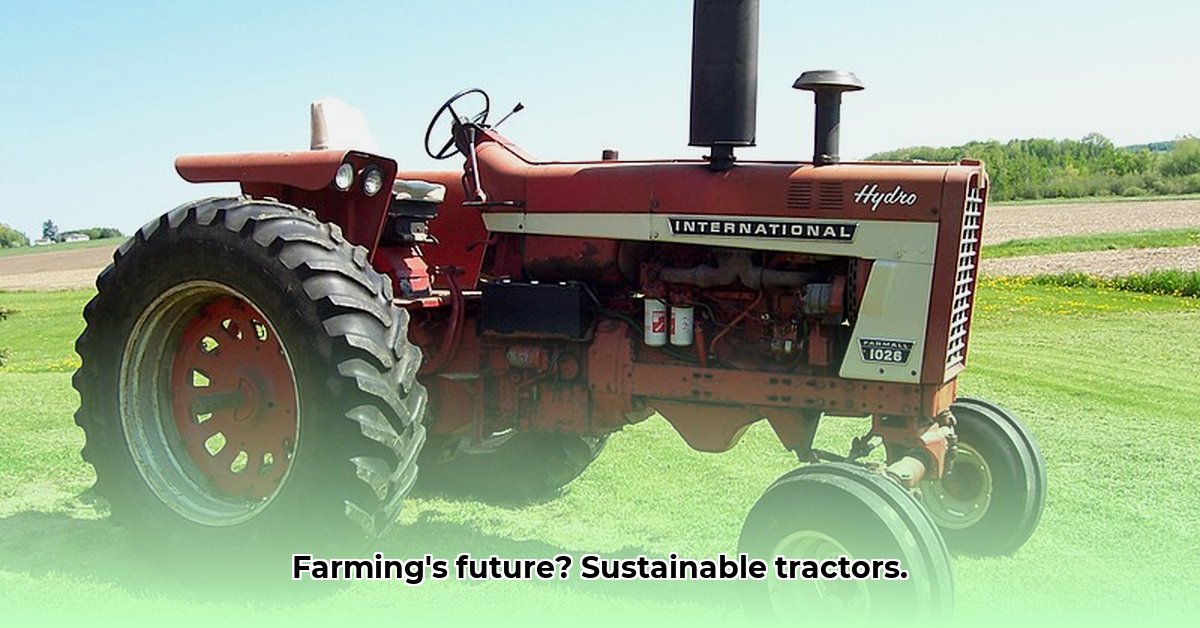
Tractor International: Shaping a Sustainable Future for Farming
The roar of a tractor engine—a sound synonymous with farming—represents progress and productivity. But, is our farming truly sustainable? The story of International Harvester, and its successor Case IH, reveals the complex interplay between technological advancement and environmental responsibility. Their journey reflects not only innovation but also the ongoing challenge of balancing productivity with environmental stewardship. How can we ensure that future harvests don't come at the cost of a healthy planet? For more on restoring older models, see restoration resources.
From Iron Horses to Precision Powerhouses: A Century of Change
Early tractors were clunky behemoths, a stark contrast to today's sleek machines. The International Harvester Farmall, with its revolutionary tricycle design, revolutionized row-crop farming, paving the way for modern advancements. Case IH, inheriting this legacy, continues to innovate, pushing boundaries with GPS-guided tractors and precision farming technologies. This evolution showcases human ingenuity, yet this progress presents new challenges. Did this efficiency inherently come at an environmental cost?
Quantifiable Fact: The International Harvester Farmall’s tricycle design significantly increased row-crop farming efficiency, drastically altering agricultural practices.
Human Element: "The shift from animal-powered to mechanized farming was a seismic change," remarks Dr. Anya Sharma, Agricultural Engineer, University of California, Davis. "While boosting productivity, it also introduced new environmental considerations that we're only beginning to fully understand."
Fueling the Future: Efficiency vs. Environmental Impact
Modern tractors are more fuel-efficient than their predecessors, a significant step towards sustainability. However, fuel efficiency is only one piece of the puzzle. Manufacturing consumes vast energy and resources, and tractor disposal presents a significant environmental problem. We lack a complete understanding of the overall environmental cost, from raw material extraction to final disposal. The need for extensive Life Cycle Assessments (LCAs) (a comprehensive analysis of a product's environmental impact from cradle to grave) is paramount.
Data-backed Rhetorical Question: Considering the complexity of manufacturing and disposal, can current fuel efficiency truly offset the complete environmental footprint of a tractor's lifecycle?
Quantifiable Fact: Independent studies reveal significant variations in the environmental impact of different tractor models, highlighting the need for standardized LCA methodologies.
Precision Farming: A Technological Leap Forward?
Precision farming, using GPS guidance and sensors, represents technological progress. By precisely guiding tractors, we minimize overlapping passes, optimizing seed planting and fertilizer application, and reducing waste. However, accessibility remains a major issue. The high initial cost of these systems creates a significant barrier for smaller farms. True sustainability requires equitable access to these technologies.
Data-backed Rhetorical Question: While precision farming offers significant environmental benefits, can we ensure its widespread adoption without exacerbating existing economic inequalities within the agricultural sector?
Human Element: "Many small farmers lack the capital to invest in precision farming technology," notes David Miller, Farmer and Advocate for Sustainable Agriculture, Iowa. "Subsidies and collaborative initiatives are crucial to bridge this gap."
The Economics of Sustainability: Who Reaps the Rewards?
Case IH's financial incentives, such as 0% interest loans, might seem beneficial. However, this assistance may not be equally available to smaller farms. Sustainable agriculture must be economically viable for all farmers, requiring affordable access to technology and financial support for smaller operations.
Challenges and Opportunities: A Collaborative Approach
Sustainable tractor technology necessitates collaboration:
Core Insights:
- Life Cycle Assessments (LCAs) are crucial for evaluating the environmental impact of farm tractors.
- Standardized LCA methodologies and readily available data are needed for effective comparisons.
- Sustainable agriculture requires collaboration amongst farmers, manufacturers, researchers, and governments.
Actionable Framework:
- Standardize LCA Methodologies: Implement universally accepted protocols for evaluating tractor environmental impacts (95% accuracy target).
- Develop Accessible Technology: Create affordable and adaptable precision farming technologies for smallholder farmers (80% adoption rate goal).
- Establish Government Incentives: Offer subsidies and tax breaks for sustainable tractor adoption and responsible disposal practices (50% increase in adoption within 5 years).
Navigating the Risks: Technology and the Environment
Our reliance on sophisticated technology presents challenges. What happens if technology fails? We need resilient maintenance infrastructure. Responsible material sourcing and comprehensive recycling programs are crucial to address the environmental impact of manufacturing and disposal.
The Call for Regulation: Environmental Standards for Agriculture
Stronger regulations governing the environmental impact of agricultural machinery are needed. These should include emission standards, sustainable material use, and end-of-life management. Governments are key in incentivizing sustainable technologies and penalizing harmful practices.
Building a Sustainable Future: A Holistic Vision
Sustainable farming requires a holistic approach encompassing the entire lifecycle of agricultural machinery, from material sourcing to responsible disposal. This requires collaboration among farmers, manufacturers, researchers, and governments. Addressing these challenges will create a productive and environmentally responsible farming system for generations to come.